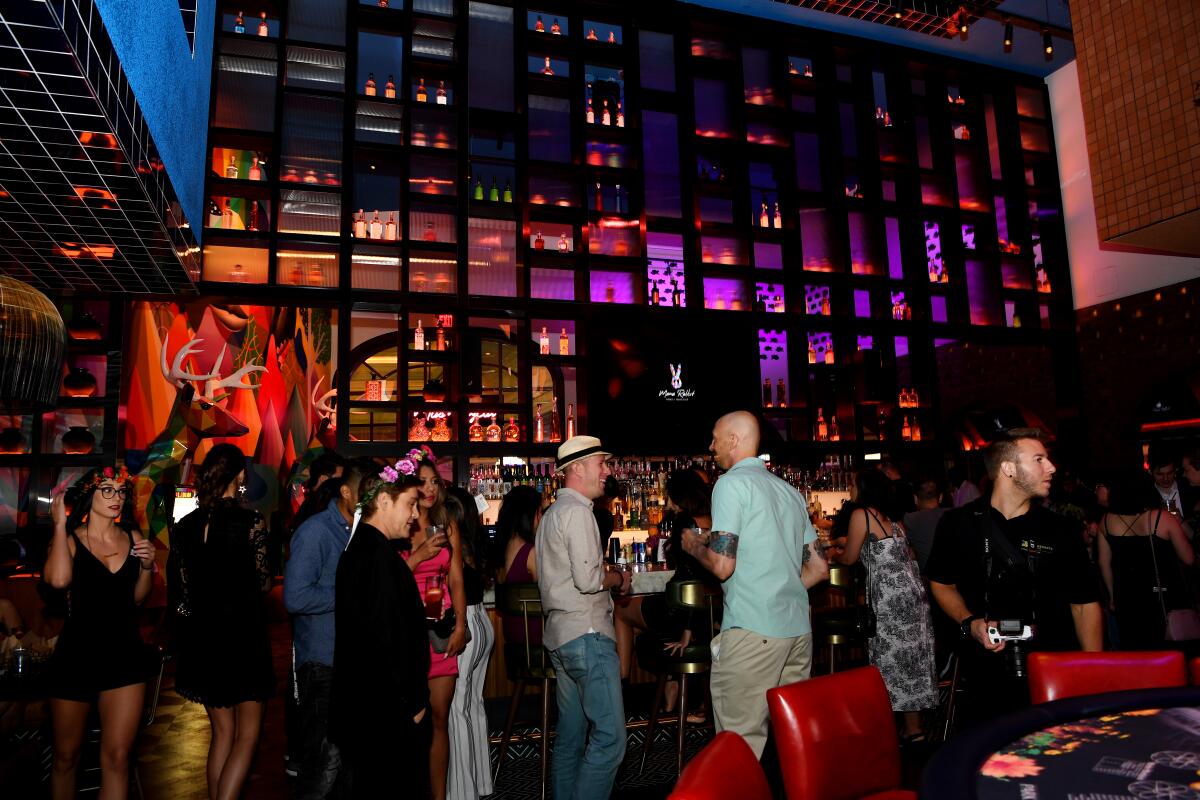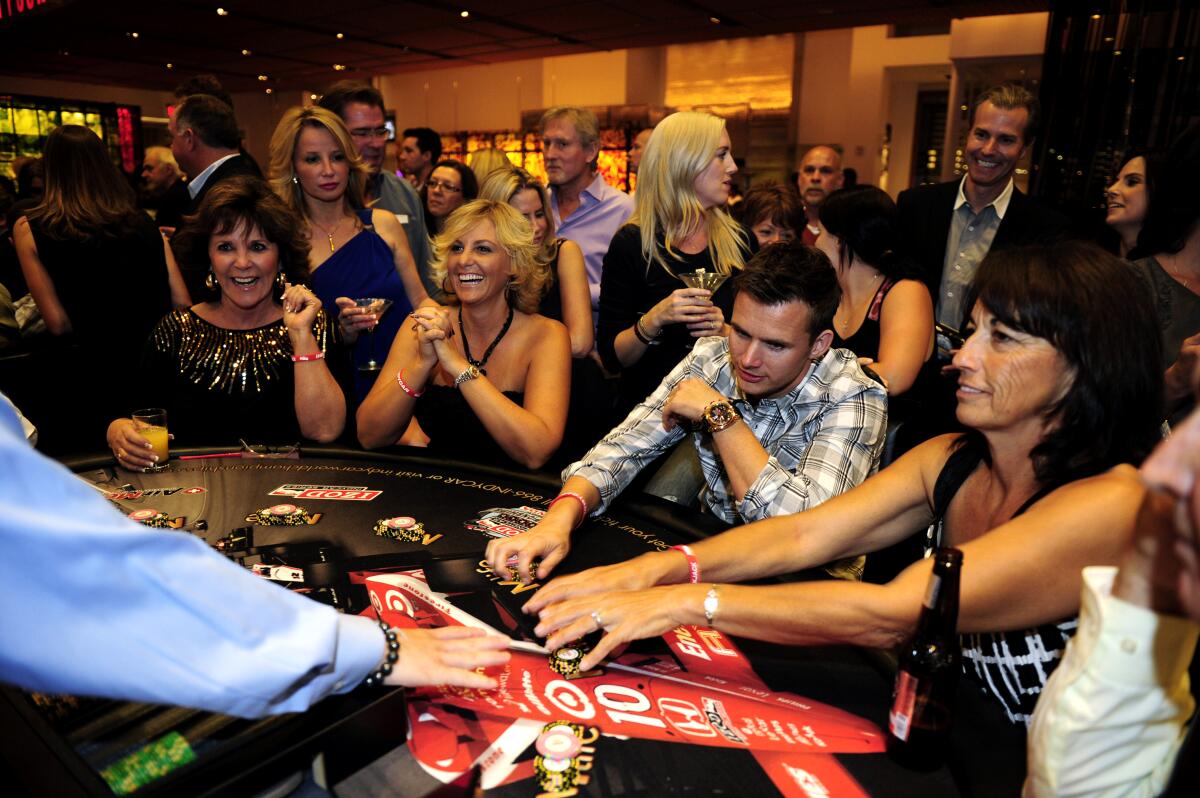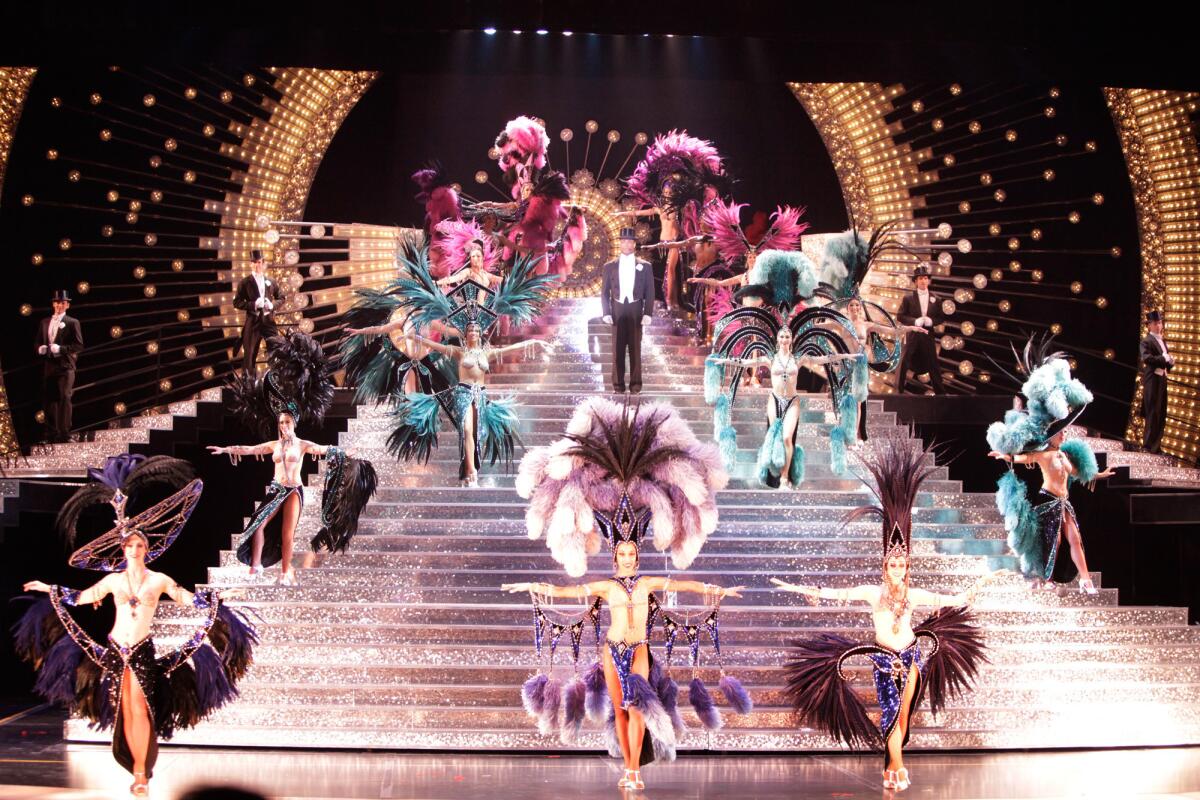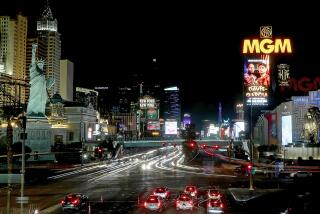Unfazed gamblers, worried showgirls: Las Vegas on edge as coronavirus arrives

- Share via
LAS VEGAS — In the morning’s dark hours, as the desert air stung cool and showgirls were losing their sheen, a crowd cheered at the Venetian when a man put a $20 bill in his mouth and fed it into a slot machine.
Chips rattled on blackjack tables, clubbers sweated on a packed dance floor and friends snapped photos on crowded walkways. Few seemed to notice janitors discreetly spraying disinfectant or the hand sanitizer stations scattered throughout the casino. Gamblers by nature are high risk. They have braced against recessions, rode out unlucky streaks.
And now, in the early days of America’s coronavirus outbreak, they are as sanguine as the dealers who take their money. Even with the prospect of the virus settling in, and crowds in coming days and weeks growing thin, Andy Esala, a 34-year-old assistant plant manager from Tennessee, senses only opportunity.
“Fewer people means shorter lines,” he said.

But in a town where the economy rides on the sleight of hand of public perception, casino and resort workers are worried how much the outbreak will impact a $6.6-billion gambling industry that annually attracts more than 42 million people to this riot of neon in the desert. The virus, to them, is a straight against a pair of twos.
From Asia to Europe and the Middle East to North America, officials have canceled festivals, religious pilgrimages and sporting events. Museums, theme parks and schools in Milan, Shanghai and Tokyo have temporarily closed in an effort to halt the spread of a novel virus that thrives in congested and crowded spaces.
The ripple of anxiety is now being felt across the United States — particularly in Washington and California, where at least 11 people have died. Grocery store aisles have been stripped bare of preservable foods, cleaning supplies and protective gear and even orchestras — their performances streamed online — are playing empty houses.
So far, Las Vegas — the nation’s mecca for gamblers, conventions and concertgoers — remains relatively unscathed.
But for how long?
On Thursday, the Southern Nevada Health District announced its first case. The Centers for Disease Control and Prevention has yet to confirm the positive test result, but health officials in Nevada said the patient is a Clark County man in his 50s who recently traveled to Washington and Texas. He is hospitalized in isolation.
Shining in sparkly red bikinis and headdresses encrusted with rhinestones, showgirls Maggie Schofield and Eliana Colon glided down the Strip on a recent night. Their plumes of costumed feathers caught the eye of a tourist who asked to pose with them for a photo. They smiled and obliged. But Schofield and Colon are increasingly uneasy that someone they come across may have the virus and pass it on to them.
“People and kids like to give hugs and stand next to us,” Schofield said. “I take vitamins and carry hand sanitizer. But there’s little else I can do.”
History has shown that Sin City is vulnerable in times of national and global crises.
Decrease in air travel and tourism following the Sept. 11 attacks led to gambling revenue dropping in 2002 by 1% compared with the prior year — the first such decline in three decades. The 2008 recession saw an even steeper dip as gambling revenue for top casinos fell 4%, according to the Las Vegas Convention and Visitors Authority.
The city faced an existential crisis in 2017 when a gunman carried out the deadliest mass shooting in U.S. modern history at the Route 91 Harvest festival, killing 58 people. And it is now becoming clear that COVID-19, which is forcing large cancellations in travel and vacation plans, may hit Las Vegas hard.
“The magnitude has yet to be seen,” said David Schwartz, a gambling historian and professor at the University of Nevada, Las Vegas.
The threat of coronavirus has left showgirls, housekeepers and resort employees spooked. Some are worried about losing their jobs or becoming financially strapped if resorts and casinos temporarily close. Others fear it’s only a matter of time before they’ll be infected.
“I read the news all the time now,” said taxi driver David Swank.
If business plummets, Swank worries he soon won’t be able to afford rent.
“I used to wait only around 25 minutes to pick people up at the airport. Recently, I’ve been waiting 45 minutes,” he said. “My girlfriend works for a resort on the Strip and she is worried about losing shifts and maybe even her job.”
Las Vegas is one of the largest convention destinations in the nation; about 6.6 million visitors come each year for conventions and business meetings, according to the Las Vegas Convention and Visitors Authority’s most recent data. In January, visitor and hotel occupancy increased compared with the year before, the LVCVA reported.
Several conventions are still proceeding, but losses are already being anticipated: Software company Adobe is pulling out of hosting its summit this month at the Venetian, and plans to host the Assn. of Southeast Asian Nations have been postponed.
Travel restrictions also pose a threat. In 2018, the LVCVA found that 20% of all visitors were from foreign countries. Europe and Asia play prominent role in Las Vegas’ gambling scene, including high rollers from China, the epicenter of an illness that has killed 3,281 and infected 95,265 worldwide.
An annual report from Wynn released last week said that “the outbreak of the novel coronavirus has had and will have an adverse effect on our results of operations.” The report added later: “A significant portion of our U.S. business relies on the willingness and ability of premium international customers to travel to the U.S., including from mainland China.”
A spokesman for Wynn Las Vegas said that its managers are “in close contact with the Southern Nevada Health District who is monitoring the situation along with the CDC.” Other property owners have yet to respond to comment.

The adult playground that is Las Vegas is only as successful as the fantasies it promises. But its entrepreneurial ecosystem depends on fulfilling people’s desires. Cracks in the town’s carefully crafted image are a major threat.
Those on the front lines — housekeepers, janitors, managers, dealers, promoters — have been told to implement stricter hygienic measures in a clandestine manner so as not to scare visitors.
“Everyone is on heightened alert, but it’s behind closed doors,” said Sesan Frison-May, a security manager for a casino whose name he asked not to disclose. He added that secrecy in the name of protecting business interest has always remained a top priority.
“We have to keep our mouths shut, but eventually it will hit here. This is a big deal because it’s hard to predict in terms of how people will feel. We just don’t know,” he said.
Late Sunday night, after the crowds had dispersed, 37-year-old Kereece Small, a saleswoman at Pandora Jewelry Store at Venetian, turned to her colleague Bianca Franco.
“I wish I didn’t have to come to work,” Small said. “I got sick in January and went to the hospital thinking I had gotten coronavirus. Luckily, I tested negative and it was just pneumonia.”
She’d prefer not having to brush against tourists.
“I’m on edge,” Small said.
But the man sipping Jack Daniel’s and Coke at a sports bar was not so anxious. Esala, the 34-year-old from Tennessean, nodded to a visitor. Esala comes to Las Vegas a few times a year to gamble. He looked around the bar; saw fewer people than he’s used to, and noted that maybe the coronavirus is keeping the less adventurous away.
“That’s good news for me,” he told the bartender while watching a basketball game on TV he had bet on. “I’ll embrace smaller crowds.”
For other gamblers, jokes take front and center in coronavirus conversations. At the downtown Fremont Hotel and Casino, 60-year-old Roger Esplain wiped beer from his mouth and pressed the screen on the blackjack machine.
“I can beat it! I can beat anything! I have a high metabolism,” said the New Mexico native. He laughed and pressed the screen again.
Outside, Alex Phan stood alongside his friends. They sipped frozen margaritas, and were in town for a bachelor party.
“I travel several weeks a month and go on planes, so I’m not worried,” said Phan, who lives in San Diego. “If we talk about it [the virus], it’s probably because we’re teasing each other.”
More to Read
Sign up for Essential California
The most important California stories and recommendations in your inbox every morning.
You may occasionally receive promotional content from the Los Angeles Times.












